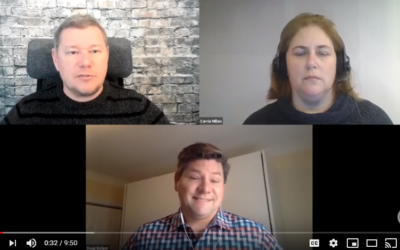WHAT HAPPENS WHEN YOU TREAT LEADERSHIP SKILLS LIKE HARD SKILLS AND DESIGN YOUR PROGRAMS AROUND THE IMPACT YOU ARE TRYING TO CREATE.
WE FIND OUT IN THIS EPISODE OF LEARN2 LEAD.
Transcipt:
Tom Lyons 0:04
Hi e verybody, it’s Tom Lyons here from Learn2 and we’re here with Carrie Millen our lead facilitator and Doug Bolger, our CEO. Many of you know him as well. And we’re here to talk about soft skills and specifically about soft skills and impact. For instance, if I was trying to learn to type, I would either take a course, I would get some software, I would then go in and I would practice it, and I would be able to measure it. And I would know when I’m becoming competent with that skill, but with soft skills, we see a completely different approach. Why is that?
Carrie Millen 0:34
Great question, Tom. Often that is because learning and development, if you think about how or why their teams were originally created, and how it’s very much back in the industrial age, you created a skill ultimately to help with safety and they were very focused on the end result. Now often learning gets direction from up top that we need to develop leadership skills and they aren’t given the difference. So they try to put in many great pieces that they think together without having that direct line to what’s the real impact in the business? Because in most cases, the business actually doesn’t know what that impact is. They just know they need it
Doug Bolger 1:14
Without being clear on what the outcome is the terminal outcome in our language, like, are we raising dollars per FTE? Unless you have that measure and metric, your leadership development is literally just sprayed without a focus
Tom Lyons 1:32
It’s like we know we need leadership skills. But if it was any other skill, there’d be an assessment it would be we need this specific thing to accomplish this specific thing. So you touched on that a little bit and I’d like you to go a little deeper, if you can.
Doug Bolger 1:44
Yes, said differently on the assessment, I would say it’s like, what’s the gap? What’s being measured, like in this leadership program, we want to impact this by this amount by this date. So incredibly clear our million dollar Leadership Program, that one that’s now been adopted into the nine digital modules. That program literally has you pick, here’s the impact I want to make, here’s how I’m going to measure it. And so we don’t even consider that most of the time in the learning and development, talent development hypo programs, we go in to focus in on the person and to me that’s developing leadership, versus helping people learn to lead by actually leading to an actual outcome.
Tom Lyons 2:37
So Carrie, I’m gonna ask, I’m gonna direct this one directly to you. Okay, in our industry. Yep. Over the last several years, we’ve seen this increase in in companies saying that we are spending a lot on leadership development. We feel like a lot of it is going down the drain. And I think it’s a big part of that is because we don’t put impact first and then tie what type of learning needs to go to drive that impact? So what do you think the biggest challenge is for companies to overcome that tendency?
Carrie Millen 3:11
I think the biggest way to overcome that tendency is, is for learning and development to learn how to actually take a backseat in this and actually put the ownership on the learners. Often, you know, we said they don’t do an assessment, often, an assessment is done, and we get a high level I want to do this, but there’s no connection to me as a learner. Learning and development needs to actually get out of the way and realize you hired amazing freaking employees, give them the power and the ownership to make a difference. And the tools to in turn make that difference. Then you will see it drive performance. And so it’s a real mind shift and change in responsibility because they used to be police in control, and now they hold the space for other people to learn and make that impact.
Doug Bolger 4:00
I think that’s well said, I think the the challenge for us is that we most the people in our industry, we believe in the inherent value of helping people and supporting people and developing people, which is great. And then you have a crisis like this that comes along where people are just like, well, that’s great, but it’s actually not going to help us achieve our business outcomes. And that’s, I think the root of some of our challenges is we’ve been focused on the content. And we keep telling and developing content, buying content, really, you want to focus on the process.
Tom Lyons 4:40
It’s this concept of competence, right where people don’t leave a classroom competent they leave a classroom knowledgeable.
Carrie Millen 4:49
And, Tom to add on to what you said, it’s, it’s applying those skills and getting up to a competence level and most importantly, learning how to recover and recover without an instructor. Getting over you to telling you what the keystrokes you’re supposed to have. Being able to self recover and use your peers is so important.
Tom Lyons 5:06
Let’s move to something super relevant right now, which is leadership development. But it’s one thing to talk about development and leadership skills. Like two months ago, it’s another thing to talk about leadership development skills in this crazy world right now, like this level of uncertainty that so many companies are going through what change has to occur, both in leadership development, and what change has to occur in the way that we lead in this new environment.
Carrie Millen 5:34
I alluded to it a little earlier. Ownership is a huge portion you used to have your staff here, now your staff are all spread apart. They’re keeping the ship afloat, probably working more hours than they were before. And really want a purpose, really want a reason to be there. So giving them that ownership and that empowerment to make a difference. On top of giving them the skills to be able to do that. That’ll create their own little businesses that their own running, they’re driving forward with that kind of activity. It’s that ownership. A, you don’t have to control it all. They’re amazing. Allow them to make ripple effects within the business.
Doug Bolger 6:16
I would say that there’s never been a time where we’re more CEO of our own role. Now we’re really intentional about how we organize our time who’s on the call, what’s the purpose of the call? What’s the outcome of the call? So I think we’re seeing a lot more intention and getting clear. Which ties back to Carrie’s point of like, what is the purpose? And right now, the main things I think leaders have to do is just get a super clear purpose.
Tom Lyons 6:47
This is a real opportunity, though, because for engagement to occur, you would think it’s the opposite because they’re they were moving them outward, but Carrie really hit it on the head, where now you have this chance to engage them in an and make them understand their role is actually really important. They have a strong purpose within the company that maybe they didn’t feel before because they were more controlled, right?
Carrie Millen 7:10
Absolutely. Often it’s out of sight out of mind, what an incredible opportunity is now to get noticed by a lot of people in the business. And also when you make an impact, and you are lower down in the hierarchy of a company, not only does that impact help me in my performance for the year, it helps my manager, skip leader and up, it actually has a huge cascading impact. It’ll help our team and so much more.
Doug Bolger 7:35
You’re speaking to like a program we ran on Wednesday, one of the participants went in and said the impact I want to make is I want to fix this process. It doesn’t work. Well what’s the impact of that throughput is going to increase dramatically. And number of amount of rework is going to change dramatically. This lead with which we’re able to service, an upset or frustrated customer is going to shorten dramatically. You walk out with three core measures on a project you’ve just implemented and annualize those savings into the tune of millions of dollars, you’re going to get noticed by not just your leader, your leader’s leader, because everyone up through that chain to the executives is going to hear about your leadership, your future inside that organization. It’s different now.
Tom Lyons 8:34
So pulling this back in, what closing advice do you have for companies regarding both leading and their leadership programs today, their leadership development programs, what should they do?
Doug Bolger 8:44
Focus in on the process of actually producing impact. And that means that all the content stuff that all these leadership development, people want to give a lot of that needs to fall away and it needs to be become outcome focused with measurement and a lot of accountability. That means you can move to that very quickly.
Carrie Millen 9:09
Trust that you hired amazing people and they’re super talented. And just give them a few of the tools and they’re gonna build the future that you want.
Tom Lyons 9:18
Completely. Okay, my closing advice. Call us! Call Learn2, that is my advice for you. We we know how to do that assessment. We know how to help you through those those problems. We know how to create the impact that you’re looking for out of your leadership development. We have the programs that work online in a world where you can’t bring them together. We have those solutions. So my advice is call us. Okay. Thank you.
Carrie Millen 9:44
Thanks a lot.
Doug Bolger 9:45
Thanks, Tom.
WHO’S LEARN2?
We’re Learn2, and it’s our mission to change the way the world works. We would love for you to join us in that mission. Here’s what to do, see this link? It’s for a quick 10 question assessment that will give you deep insight into your natural communication style. You’re going to love it. You need to do it, click the link and take the assessment, trust me. After that I really hope you’ll consider working with us, we create amazing results for our clients and would love the opportunity to do the same for you.







